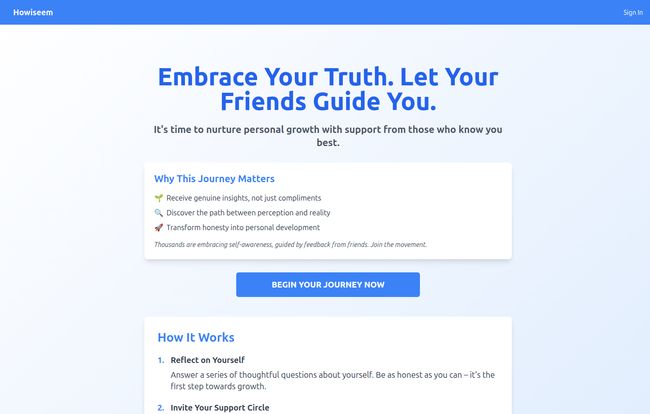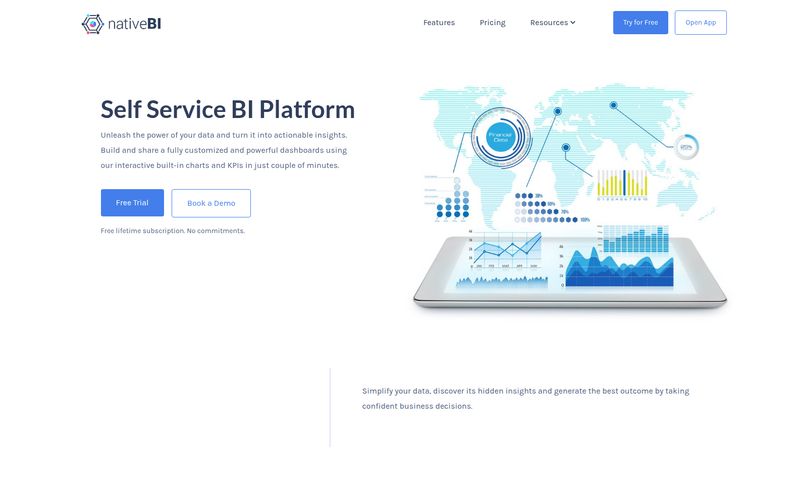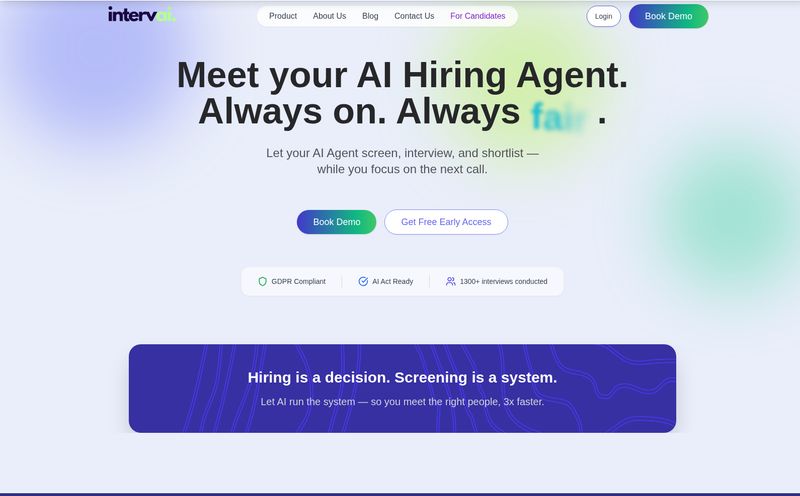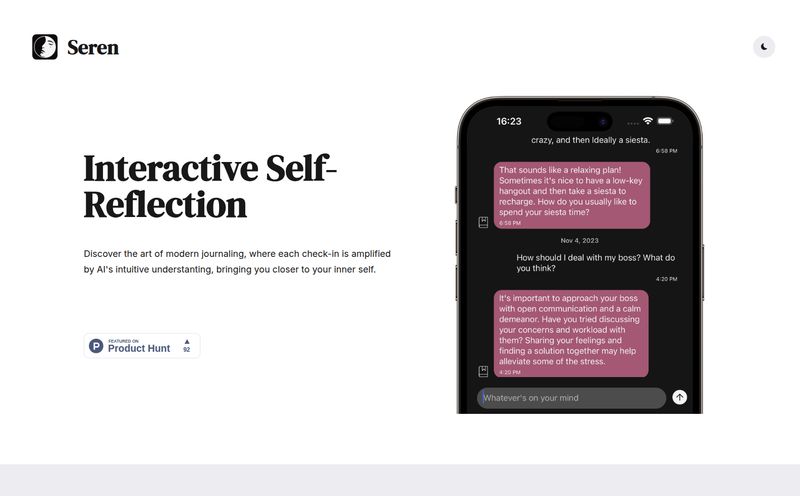I once went through a phase where I thought I was the epitome of “chill.” You know the type: easy-going, low-maintenance, a human embodyment of a lazy Sunday afternoon. I was convinced this was the vibe I was putting out. It wasn't until a good friend, after a couple of beers, gently informed me that I’m actually perceived as “intensely passionate” and “sometimes a little overwhelming.”
Oof. It wasn’t an insult, not really, but it was a massive disconnect between my self-perception and reality. It’s that classic blind spot, isn’t it? The part of ourselves that we just can’t see. Psychologists have fancy names for this, like the Johari Window, which describes the parts of you known to others but not to yourself. For most of us, uncovering that blind spot involves either years of therapy or a very brave, slightly tipsy friend.
Or, apparently, an app. That's where I stumbled upon Howiseem. The tagline on their site is, "Embrace Your Truth. Let Your Friends Guide You." It sounds so… wholesome. But let’s be honest, asking your friends what they really think of you sounds about as relaxing as a casual stroll through a minefield. Still, as a sucker for all things SEO, trends, and personal development, I had to see what this was all about.

Visit Howiseem
What on Earth is Howiseem?
At its core, Howiseem is a self-awareness tool that tries to bridge the gap between how you see yourself and how your friends see you. It’s not just a quiz you take in a vacuum. It’s a two-way street. First, you answer questions about yourself. Then, you send a link to a few trusted friends, who answer questions about you. The platform's AI then supposedly crunches all these different perspectives and spits out a personalized report revealing your blind spots, strengths, and areas for growth.
Think of it like a highly-structured, tech-brokered intervention, but hopefully with less crying. It’s an attempt to systematize that raw, messy, and often-avoided process of getting honest feedback.
The Four-Step Process to (Supposedly) Finding Yourself
The app breaks down this potentially terrifying experience into four neat steps. It all looks very simple and clean on their website, which I appreciate. It helps calm the nerves.
Step 1: Reflect on Yourself
This part is easy enough. You're presented with a series of questions about your personality, your habits, your values. It’s a moment of introspection. You have to be honest with yourself, or the whole experiment is pointless from the get-go. No biggie, I know myself pretty well. Or so I thought.
Step 2: Invite Your Support Circle
Okay, here’s the first real hurdle. You need to choose at least three friends to be your “personal growth companions.” Who do you pick? The friend who always agrees with you? The one who’s brutally honest to a fault? Your work bestie? Your mum? The app says to choose people who know you well. The unwritten rule is to choose people you trust not to metaphorically shank you. This step alone is a fascinating psychological test. It took me a solid hour to pick my three victims… I mean, companions.
Step 3: Receive Caring Insights
After you’ve sent your invites, you wait. Your friends get their own set of questions about you. The app mentions that its “AI will analyze their responses.” This is where the modern magic comes in. It's not just a collection of quotes. It's an analysis. The waiting period is filled with a low-grade hum of anxiety. What are they saying? Did I pick the right people? Should I have bribed them with coffee first?
Step 4: Embrace Your Journey
Then, the report arrives. The final step is to read your personalized report and “embrace” the findings. Even Howiseem admits, “It might challenge you, but that’s where growth begins.” You have to admire the honesty. They know this could sting a little.
The Good, The Bad, and The Brutally Honest
So, after going through it all, is this thing a gimmick or a genuine tool for growth? Like most things in life, the answer is… complicated.
On one hand, the potential upside is huge. For years, corporate execs have paid big bucks for “360-degree feedback” to become better leaders. Howiseem is basically democratizing that process. Getting concrete examples of where your perception and reality misalign is pure gold for anyone serious about self-improvement. It takes the guesswork out of it. Instead of wondering, “Am I a good listener?” you might get data suggesting three of your closest friends think you interrupt them constantly. That’s actionable. And frankly, having an app mediate this is way less awkward than trying to solicit this feedback over dinner.
However, the entire system is built on a foundation of some pretty wobbly assumptions. The biggest one is the honesty of your friends. The accuracy of your report is 100% dependent on their willingness to be candid. If your friends are too nice and just click the positive options, you've learned nothing. It becomes a digital pat on the back. A complete waste of time.
Conversely, what if they're too honest, or just having a bad day? Receiving unexpected negative feedback can be tough. It requires a certain level of emotional maturity and a really thick skin to process it constructively instead of just getting defensive or hurt. There’s a real risk here if you're not in the right headspace. And while the AI analysis is a cool feature, let's be real—an algorithm can't fully grasp the nuance of human relationships. It can spot patterns, sure, but it can't understand the inside joke behind why a friend called you “chaotic” (which could be a term of endearment!).
Who is This App Really For?
I wouldn't recomend this app to everyone. If you’re deeply insecure or struggling with social anxiety, this might just pour gasoline on the fire. It’s not a toy. It's a tool, and a sharp one at that.
But for a certain type of person, it's brilliant. If you're someone already on a path of self-discovery, maybe you're in therapy, or you're a leader, a freelancer, or anyone who relies on interpersonal skills—this could be incredibly valuable. You just need to go in with your eyes wide open, ready to accept that the mirror might show you a few things you dont want to see.
What's the Price of Truth? Howiseem's Pricing
This is always a big question for any new tool. As of writing this, Howiseem appears to be completely free. I couldn't find a pricing page, and the sign-up process didn't ask for a credit card. In fact, when I tried to find a pricing page, I hit a 404 error, which tells me they're probably a new startup still figuring out their business model. My advice? Get in now while the getting's good. They might introduce a subscription or a one-off fee for reports later on.
Final Thoughts: Is Howiseem Worth the Emotional Risk?
So what’s my final verdict? I think Howiseem is a fascinating, powerful, and slightly dangerous tool. I love the concept. I love that it’s pushing us to have conversations we should be having but are too afraid to start. It gamifies self-awareness in a clever way.
But its effectiveness rests entirely on you and the people you choose. You are the curator of your own feedback. If you choose wisely and approach the results with curiosity instead of judgment, you could uncover insights that truly change how you move through the world. If you choose poorly or aren't ready for the truth, it could just be a source of anxiety. It's a gamble. But for me, it was a gamble that paid off with a few much-needed reality checks. Just like my friend told me—I’m not “chill.” And you know what? I’m starting to be okay with that.
Frequently Asked Questions
- How does Howiseem actually work?
- It's a simple four-step process. You take a self-assessment quiz. You then invite at least three friends to answer questions about you. The app's AI analyzes all the responses to create a personalized report highlighting your strengths and the differences between your self-perception and how others see you.
- Is the Howiseem app free to use?
- Yes, at the moment, Howiseem seems to be completely free. There is no pricing information on their website, which suggests they may be in an early startup phase. This could change in the future.
- Is the feedback from my friends anonymous?
- The feedback is aggregated and analyzed by AI, so your report will present themes and patterns rather than direct, attributable quotes. This provides a layer of anonymity to encourage honesty, so you won't know exactly which friend said what, but you'll see the collective insights.
- What if I get feedback that upsets me?
- This is a real possibility. The app itself advises that some findings might be challenging. The key is to approach the report with an open mind and a goal of understanding, not defending. It's best to use the app when you're feeling emotionally resilient and ready for honest critique.
- How is AI used in the Howiseem app?
- The AI is the core of the analysis. Instead of just showing you a list of your friends' answers, the AI processes the data from both your self-assessment and your friends' feedback. It identifies key patterns, discrepancies, and consensus points to generate a coherent, insightful report.
- Can teams or businesses use Howiseem?
- While it's designed for personal growth, the model is very similar to professional 360-degree feedback tools. It's not explicitly marketed for teams yet, but it could certainly be used informally among a small, trusting team looking to improve dynamics and communication.
Conclusion
Self-awareness isn't a destination; it's an ongoing practice. Tools like Howiseem offer a new, technology-driven path to get there. It’s not a magic bullet, and it won't solve all your problems. But it can give you a map—a map drawn by the people who know you best—showing you where your blind spots are. And sometimes, just knowing where to look is the most important step of all.
Reference and Sources
- Howiseem Official Website
- Understanding the Johari Window - For more on the psychology of self-awareness.



